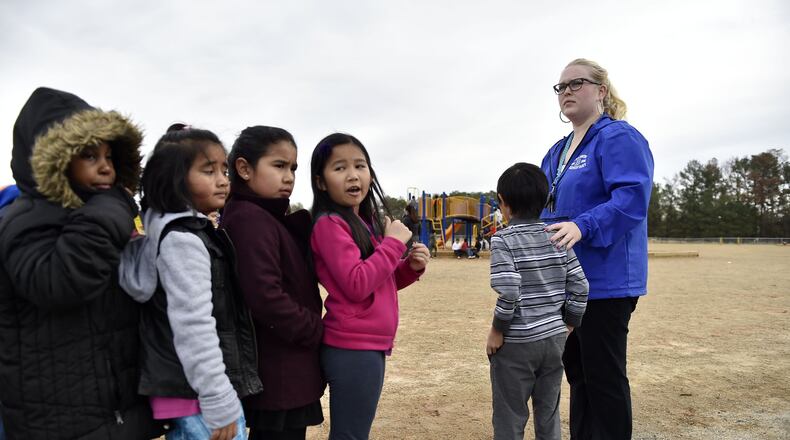Audrey Smith’s first-grade class was enjoying recess a recent December morning when a potential crisis developed.
A boy in her class was slumped on the ground holding his left knee. He was near tears.
Smith ran to him. She played doctor and returned about a minute later looking relieved. The boy was on his feet, moving gingerly, but moving.
“He’s fine.”
For Smith, a first-year teacher at Gwinnett County’s Baldwin Elementary School, the job is managing one problem after another. Some of her long days are easier than others. She is learning from rookie mistakes and working to improve.
“I’m excited for (the next school) year already,” she said.
Many young teachers are unable to adjust to the stresses and demands of the job of teaching while managing classrooms full of kids, with predictable results. Atlanta-area school districts, like much of the nation, are struggling to keep younger teachers. One state agency reported 44 percent of new teachers leave the profession within five years. They're frustrated by the meager pay, increasing test performance demands and the use of test results in judging job performance. The Atlanta Journal-Constitution is monitoring Smith's first year on the job to get a sense of the obstacles first-year teachers face.
She now gets why the turnover rate is so high. In one interview, a month after the school year began, she outlined some of her challenges. There’s so much to learn. Some students were below the school district’s academic standards. Smith, a first-time mom with an infant son, was determined not to take her schoolwork home with her.
“This season is the toughest season of my life,” Smith, 25, said. “I’m dealing with being a new mom, a new teacher at a new school.”
She talked some more about the difficulties and then noted, perhaps a reminder to herself that “It’s tough for any teacher.”
Smith has embraced her class. Like many veteran teachers, she calls the students her “babies.”
She has 20 babies, including one that recently arrived from another state.
The students are curious, charming and sometimes mischievious.
They cry easily, learn quickly and some start trouble when she’s not looking, like one boy who hit some classmates with his water bottle.
It’s a job that requires energy (fueled, for her, by Starbucks), a command of the class and Smith’s constant desire to be a lesson-plan ahead.
Many new teachers struggle because they panic in stressful situations, said Smith’s principal, Brenda Johnson. Smith, she said, has shown poise that signals she could have a bright future.
“She teaches with a veteran’s heart,” Johnson said. “She’s steady at the wheel. It’s rare with a brand new teacher.”
Smith's most harrowing moment on the first day of school came when two students nearly missed their bus ride home. She raced with the students outside to ensure they were not left behind. On a recent visit, there were signs Smith's grip on the class was stronger. There was a preacher-like call and response to her commands. Stickers rewarding good behavior seemed to be a strong incentive.
Smith spends a lot of her time teaching her students social skills, such as sharing, working quietly and cleaning up behind themselves. She’s also teaching them how to write a story, about Thomas Jefferson; basic subtraction and how to tell time.
Baldwin Elementary, near Norcross close to a busy stretch of Buford Highway, has a large percentage of Hispanic students. Smith, who is fluent in Spanish, occasionally speaks to some of them in that language, something she didn’t do much on day one.
“They were strangers to me and I was a stranger to them,” she said. “As I got to know them … I was able to see” how to communicate with them.
In the rush of the first day, Smith forgot to eat lunch. She now eats with her students, using that time to learn more about them and teach things such as not to try to walk up a playground slide. She encourages good behavior by congratulating students aloud when they do so.
When students interrupt, Smith asks them several questions to make them reflect on the severity of their emergency.
Is there a tornado?
Are you on fire?
The student typically stops talking and waits to be called.
“A lot of it is teaching them how to be people.”
Smith estimates she works about 60 hours a week. She typically arrives early and sometimes stays late so she can spend time at home with her son uninterrupted. Smith has bought additional workbooks and leaned on veteran teachers, sometimes watching them to learn tips.
She spends ample time preparing her students for district assessments in math and language arts, but doesn’t believe the testing is excessive. Some of her students whose parents primarily speak Spanish at home receive additional help from other teachers. Smith expects all of her students to meet the district’s standards by the end of the school year.
Her goals include encouraging her students to work independently and in small groups instead of her lecturing the class. She’s encouraging her students to find different ways to solve problems. Some students used their fingers to count while others drew lines to subtract. Either method is okay. Her greatest goal, she said, is making sure each student feels challenged.
Smith, a self-described perfectionist, is also working on managing her expectations for herself.
“Who is an expert in anything in five months?”
About the Author
Keep Reading
The Latest
Featured



